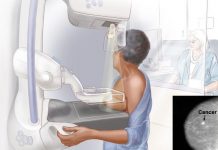Table of Contents
What is Menopause?

Natural menopause refers to the point in time when a woman has not had a menstrual period for at least twelve consecutive months. A process of biological transition, menopause is not a medical illness; however, some women experience symptoms that may disrupt their sleep and negatively impact their mood. Here are Cancer prevention: 7 tips to reduce your risk
It can take up to several years of gradual change to reach natural menopause. This period of gradual change, which many women refer to as “going through menopause,” is called perimenopause or menopausal transition.
During perimenopause, a woman’s ovaries start to make less estrogen and her menstrual periods become irregular until, eventually, they stop completely. Irregular changes in the menstrual patterns may include menstrual periods that may be longer or shorter in duration, heavier or lighter, or more or less frequent in number.
When to Expect Menopause?
 There is no way to predict when a woman will enter perimenopause, how long it will last, or when she will reach menopause. Most women start to notice some changes in their bodies when they are between the ages of 45 and 55, but some enter perimenopause when they are in their thirties and others are still menstruating well into their fifties.
There is no way to predict when a woman will enter perimenopause, how long it will last, or when she will reach menopause. Most women start to notice some changes in their bodies when they are between the ages of 45 and 55, but some enter perimenopause when they are in their thirties and others are still menstruating well into their fifties.
The timing of menopause is individual to each woman and can depend on several factors, including:
- genetics (e.g., family history of early menopause),
- ethnicity (e.g., may occur earlier in Hispanic women compared to Caucasian women),
- smoking status (e.g., the age at which menopause occurs may be reduced by two years in smokers).
Menopause can occur prematurely through medical means such as radiation and/or chemotherapy and through surgical means such as when ovaries are surgically removed during hysterectomy. In these women there is an abrupt loss of estrogen, and they stop menstruating suddenly.
What are the Menopause Symptoms?
 The symptoms of menopause may also vary from woman to woman. Some women may not experience any symptoms apart from changes in their menstrual patterns. Most women, though, will experience some symptoms.
The symptoms of menopause may also vary from woman to woman. Some women may not experience any symptoms apart from changes in their menstrual patterns. Most women, though, will experience some symptoms.
If you are experiencing troublesome symptoms associated with perimenopause or menopause, a discussion with your care provider may help in figuring out options that are appropriate for you.
ALSO READ:Treatment for Anxiety Disorders!
Here are the most common symptoms of menopause:
Hot Flashes and Night Sweats

A common complaint of women going through perimenopause or menopause. Hot flashes are sudden, obvious changes in body temperature due to low estrogen levels in the body. During a hot flash you may feel very hot, even if the temperature is low. These flashes come without warning, usually last only a few minutes, and are often accompanied by heavy sweating.
Sometimes they occur during sleep and wake you up, leaving you unable to get a good night’s rest. When they come at night, they are called night sweats. Hot flashes and night sweats may improve over time; however, these symptoms can lead to sleepless nights, irritability and difficulty concentrating.
ALSO READ-How to Cure Vaginal Infections Without Using Medications
Keeping track of when you have hot flashes and night sweats may help you identify triggers. Examples of triggers include hot beverages, spicy foods and warm weather.
Vulvar and Vaginal Discomfort
 The lining of the vulva and vagina is sensitive to estrogen. When estrogen levels fall in the body, it results in thinning of the lining. Because of this, changes in the vulva and vagina may include dryness, itching, or irritation and can interfere with sexual intercourse and cause a decrease in sexual function.
The lining of the vulva and vagina is sensitive to estrogen. When estrogen levels fall in the body, it results in thinning of the lining. Because of this, changes in the vulva and vagina may include dryness, itching, or irritation and can interfere with sexual intercourse and cause a decrease in sexual function.
Over-the-counter products that may help with some of these symptoms include vaginal lubricants used as needed (e.g., Astroglide, K-Y) and vaginal moisturizers used continuously (e.g., Replens).
If you are experiencing vaginal discomfort, discuss with your health care provider to see if these products are appropriate for you.
Urinary Tract Problems
 Pelvic muscle exercises such as Kegels support the uterus, bowel and bladder, and may help to improve involuntary urinary leaks. Discuss urinary tract problems such as infections or bladder control problems with your health care provider.
Pelvic muscle exercises such as Kegels support the uterus, bowel and bladder, and may help to improve involuntary urinary leaks. Discuss urinary tract problems such as infections or bladder control problems with your health care provider.
Emotional Changes
Impaired concentration and memory, mood changes including depression and anxiety, and sleep disturbances may affect some women. These emotional changes may be due to lower hormone levels, lack of sleep—which is a frequent consequence of night sweats—or a variety of other factors.
These symptoms while uncomfortable, are temporary responses to changing hormone levels. They may disappear once a woman’s body adjusts. Other symptoms, though, may signal a more serious problem.
Menstrual cycle irregularity is a normal part of perimenopause, but heavy bleeding, bleeding or spotting between periods, and bleeding after intercourse are not.
These symptoms should be discussed with a health care provider
Some Permanent Changes Caused by Menopause

The loss of estrogen will produce some permanent changes in a woman that can affect many parts of the body. For example:
- Bone Changes
Reduced levels of estrogen can increase the risk of developing osteoporosis, a condition which causes bones to become weak and break easily (fracture). If you have fragile bones, you may be at an increased risk of fractures, especially in the spine, hips and wrist.
- Heart Changes
A woman’s risk of developing heart disease increases after menopause. According to the American Heart Association, the death rate from heart disease in women increases significantly after menopause and is significantly higher at age 75 years in women than in men.
- Skin and Hair Changes
Skin may lose its elasticity and may bruise more easily. Both hair and skin may become drier.
- Breasts and Vaginal Changes
Breasts may become smaller and may sag. The vaginal wall may become thinner and drier, making intercourse painful and increasing the risk of infection.
As a woman ages and loses estrogen, her uterus and ovaries shrink, and the ligaments and tissues that support the organs in her pelvis become weaker, which can cause her uterus and bladder to sag. This can cause discomfort and lower back pain.
Menopause Treatment Options

Fortunately, there are steps that can be taken to relieve the symptoms and lessen the impact of menopause.
- Be smoke free.
- Eat a healthy diet.
- Exercise regularly. This will help offset the increased risks of heart disease and osteoporosis. Discuss ways to reduce your risk of heart disease and stroke with your health care provider.
- Ensure sufficient level of calcium. Make sure you are getting enough calcium through your diet and if needed through supplementation.
- Take vitamin D. The body needs vitamin D in order to absorb the calcium, so it is very important to get enough vitamin D.
- Consider taking bisphosphonates. They are non-hormonal medications that help manage osteoporosis. Selective estrogen receptor modulators (SERMs) have some of the benefits of estrogen without some of the health risks associated with estrogen replacement. Discuss with your health care provider to see if these options are right for you.
- Consider hormone therapy (HT) can be either estrogen therapy (ET) or combined estrogen and progesterone therapy (EPT). This type of therapy can be used to treat menopausal symptoms by replacing the hormones the body is no longer making on its own. Progesterone is added to estrogen therapy if you have an intact uterus. This is done to protect the lining of the uterus from cancer that may result from estrogen supplementation alone. HT is available in a variety of forms: vaginal creams, vaginal ring, vaginal tablets, oral tablets and skin patches. HT has both benefits and drawbacks, including side effects. Discuss with your health care provider to see if HT is an option for you to manage your symptoms.
- Low-dose antidepressants have been shown to help with reducing the number and intensity of hot flashes and night sweats. Discuss with your health care provider to see if low-dose antidepressants are an option for you in managing hot flashes and night sweats.
RECOMMENDED LINKS:




